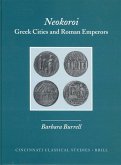What was funny about ancient jokes, and why? Why did the Roman state legislate to curb the behaviour of its obscenely rich and powerful elite, if it never really expected such laws to be obeyed? Why did it oppress the poor, and lavish public child support on them? These are important questions, but ancient Greeks and Romans could never have thought of them. They never questioned the right of the rich to be rich. They could not improve their understanding of Homeric gift-giving with the experience of ritualized friendship among the Trobriand islanders. Such questions and such answers can only come from those who live after the ancient past. This volume honours the well-known Dutch epigraphist and ancient historian H.W. Pleket. Ten substantial essays reflect his wide range, from early Greece to the Roman Empire, and his taste for comparative economic and social history.
Hinweis: Dieser Artikel kann nur an eine deutsche Lieferadresse ausgeliefert werden.
Hinweis: Dieser Artikel kann nur an eine deutsche Lieferadresse ausgeliefert werden.








